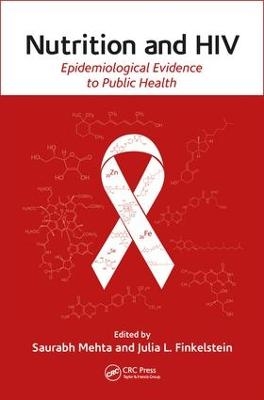
Nutrition and HIV
Crc Press Inc (Verlag)
978-1-4665-8581-2 (ISBN)
Nutritional management is integral to comprehensive HIV care and treatment. Improved nutritional status and weight gain can increase recovery and strength of individuals living with HIV/AIDS, improve dietary diversity and caloric intake, and improve quality of life. This book highlights evidence-based research linking nutrition and HIV and identifies research gaps to inform the development of guidelines and policies for the United Nations’ Sustainable Development Goals.
A comprehensive approach that includes nutritional interventions is likely to maximize the benefit of antiretroviral therapy in preventing HIV disease progression and other adverse outcomes in HIV-infected men and women. Modification of nutritional status has been shown to enhance the quality of life of those suffering HIV/AIDS, both physically in terms of improved body mass index and immunological markers, and psychologically, by improving symptoms of depression. While the primary focus for those infected should remain on antiretroviral treatment and increasing its availability and coverage, improvement of nutritional status plays a complementary role in the management of HIV infection.
Saurabh Mehta, MBBS, ScD, is a physician with expertise in infectious disease, nutrition, epidemiology, and diagnostics. He trained in medicine at the All-India Institute of Medical Sciences in New Delhi, India, and then received his doctoral degree in epidemiology and nutrition from Harvard University in Cambridge, Massachusetts. He is currently an associate professor of global health, epidemiology, and nutrition in the Division of Nutritional Sciences at Cornell University in Ithaca, New York. The overarching focus of his research program is to identify, diagnose, and intervene on modifiable risk factors such as nutrition to improve population health, with advances in technological innovation being an integral component of his approach. His research is accomplished through a combination of active surveillance programs, development of smartphone diagnostics for nutrition and infection, and randomized controlled trials primarily in resource-limited settings in India, sub-Saharan Africa, and Latin America. Julia L. Finkelstein, MPH, SM, ScD, is the Follett Sesquicentennial Faculty Fellow and assistant professor of epidemiology and nutrition in the Division of Nutritional Sciences, Cornell University. She is also an adjunct associate professor at St. John’s Research Institute in Bangalore, India, and a Faculty Fellow at the Center for Geographic Analysis, Harvard University. She received her bachelor of science degree from McGill University, Montreal, Quebec; her master of public health degree from Brown University, Providence, Rhode Island; and master of science and doctor of science degrees in epidemiology and nutrition from Harvard University. Dr. Finkelstein is an epidemiologist with expertise in designing and conducting randomized clinical trials, cohort studies, and surveillance programs in resource-limited settings. Her research focuses on the intersection of micronutrients, infections, and maternal and child health. The goal of the Finkelstein Laboratory is to elucidate the role of micronutrients (i.e., iron, vitamin B12, and folate) in the etiology of infections and adverse pregnancy outcomes with the goal of improving the health of mothers and young children. This approach integrates nutrition, epidemiology, immunology, and biostatistics with an emphasis on the translation of laboratory findings and epidemiologic evidence to inform interventions and public health practice in at-risk populations. Dr. Finkelstein serves as an external expert with the World Health Organization (WHO) Nutrition Guidelines Group; as a core faculty member in the Pan American Health Organization/World Health Organization (PAHO/WHO) Collaborating Centre for Implementation Research in Nutrition and Global Policy; as an expert consultant for the WHO Vitamin and Mineral Information System Database, a global database of anemia and micronutrient biomarkers for all countries; and as an NIH reviewer for the National Institute of Diabetes and Digestive and Kidney Diseases (NIDDK).
Introduction. HIV and Nutrition: Micronutrients. Vitamin A. B-complex. Antioxidants - Vitamins C and E. Vitamin D. Selenium. Iron and Anemia. Zinc. HIV and Nutrition: Macronutrients. Hunger/Food security. Macronutrients. HIV/AIDS and Nutrition: Maternal and Child Health. Micronutrients and HIV/AIDS in Pregnancy. Infant Feeding in the Context of HIV. Pediatric HIV: Assessment, Screening, Support. HIV and Nutrition: Public Health Practice. Co-infections - Tuberculosis and Malaria. Nutrition and HIV in the Era of HAART. Case Studies from In-Country Perspective: Senegal. Case Studies from In-Country Perspective: Zambia. Case Studies from In-Country Perspective: India. Case Studies from In-Country Perspective: Tanzania.
| Erscheinungsdatum | 24.05.2016 |
|---|---|
| Zusatzinfo | 32 Tables, black and white; 13 Illustrations, black and white |
| Verlagsort | Bosa Roca |
| Sprache | englisch |
| Maße | 178 x 254 mm |
| Gewicht | 839 g |
| Themenwelt | Sachbuch/Ratgeber ► Gesundheit / Leben / Psychologie |
| Medizin / Pharmazie ► Gesundheitsfachberufe ► Diätassistenz / Ernährungsberatung | |
| Studium ► Querschnittsbereiche ► Epidemiologie / Med. Biometrie | |
| Studium ► Querschnittsbereiche ► Infektiologie / Immunologie | |
| ISBN-10 | 1-4665-8581-1 / 1466585811 |
| ISBN-13 | 978-1-4665-8581-2 / 9781466585812 |
| Zustand | Neuware |
| Informationen gemäß Produktsicherheitsverordnung (GPSR) | |
| Haben Sie eine Frage zum Produkt? |
aus dem Bereich


